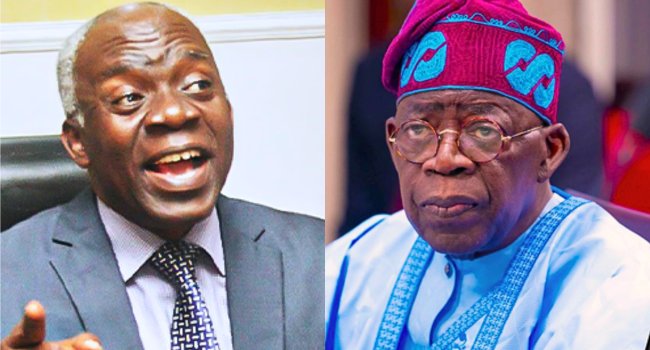
“The Middle Class No Longer Exists Under Tinubu’s Government” — Femi Falana Raises Alarm Over Nigeria’s Economic Collapse

Renowned human rights lawyer and Senior Advocate of Nigeria, Femi Falana, has declared that the Nigerian middle class has been completely wiped out under the administration of President Bola Ahmed Tinubu. In a fiery outburst that has since gone viral, Falana accused the current government of pursuing anti-people economic policies that have plunged millions into untold hardship, stripped civil servants and professionals of dignity, and destroyed the already fragile backbone of the nation’s economy.
Speaking in an interview with Channels TV, Falana lamented the devastating impact of the Tinubu-led administration’s economic decisions, particularly the removal of fuel subsidy and the free-floating of the naira. According to him, these twin policies, implemented hastily and without adequate planning, have led to unprecedented inflation, a steep rise in the cost of living, and the outright destruction of Nigeria’s middle class.
“The middle class has been wiped out,” he said emphatically. “Teachers, lecturers, engineers, bankers, journalists, civil servants — these people used to represent the heartbeat of Nigeria’s workforce. Today, many of them are unable to feed their families, pay school fees, or even transport themselves to work. They’ve all been pushed into poverty.”
Falana’s words struck a chord across the country, with many Nigerians nodding in painful agreement. Since President Tinubu assumed office in May 2023, his administration has introduced sweeping economic reforms under the banner of “bold changes” and “market-driven policies.” But for the average Nigerian, the changes have brought more pain than relief. The cost of food has tripled in some areas. Transport fares have skyrocketed. Housing, health care, and electricity have become luxuries that most Nigerians can no longer afford.
The removal of fuel subsidy, one of Tinubu’s first major policy decisions, was hailed by international financial institutions and foreign investors as a sign of fiscal responsibility. But domestically, it triggered a ripple effect that many economists say was predictable — and avoidable. Without functional refineries or an efficient public transport system in place, ordinary Nigerians were left to bear the brunt of rising fuel prices, with cascading effects on the cost of goods and services across all sectors.
Falana didn’t stop there. He took a swipe at government officials and political elites who continue to live lavishly while asking Nigerians to endure. “You are telling the people to tighten their belts while those in government are busy importing bulletproof SUVs and awarding themselves billions in allowances. What kind of governance is that?” he questioned. “You can’t ask people to sacrifice when you’re not sacrificing anything. That’s not leadership, that’s wickedness.”
As the legal luminary spoke, social media erupted with angry reactions from frustrated citizens who echoed his sentiments. Many shared personal stories of how they had lost their jobs, shut down their businesses, or resorted to begging just to survive. A teacher in Ogun State wrote on X (formerly Twitter), “I used to be able to support my family and even save a little. Now, I can’t even afford three square meals a day. My salary is worthless. I’ve gone from middle class to poor in less than a year.”
Economists are now warning that Nigeria’s middle class — once considered a symbol of economic stability and national development — is now an endangered species. With rising unemployment, mass layoffs, low purchasing power, and zero social welfare, upward mobility has become almost impossible. What this means, according to experts, is that more Nigerians are now trapped in a cycle of poverty, with no realistic pathway out.
But beyond the economic implications, Falana highlighted the political consequences of eroding the middle class. “The middle class is the engine of democracy,” he said. “They are the ones who hold leaders accountable, fund innovation, build institutions, and push for reforms. Once you wipe them out, you weaken the society’s ability to fight back, to question authority, to demand better.”
He called on President Tinubu to reverse course before it’s too late. “You cannot build a prosperous nation on the ruins of your working class. You cannot claim to be reforming the economy when the majority of your citizens are hungry and hopeless. This is not reform; it is regression.”
Meanwhile, government spokespersons have continued to insist that the economic pain Nigerians are experiencing is only temporary. They claim that the long-term benefits of the reforms will begin to manifest in the coming years. But for many Nigerians facing hunger, homelessness, and hopelessness today, that promise offers little comfort.
In major cities like Lagos, Abuja, and Port Harcourt, there has been a noticeable increase in the number of professionals turning to side hustles, petty trading, and ride-hailing jobs just to stay afloat. Doctors are relocating en masse. IT experts and software engineers are taking up menial jobs. Once-thriving middle-class neighborhoods are now dotted with “To Let” signs, as tenants flee from rent increases they can no longer keep up with.
The Nigerian Bureau of Statistics (NBS) recently reported that over 133 million Nigerians now live in multidimensional poverty. But according to Falana, those numbers barely capture the reality. “It’s far worse on the ground,” he said. “Many of those who are technically still employed are living in poverty. Their income cannot match the cost of survival. They are just waiting for the next crisis to push them over the edge.”
As the countdown to Tinubu’s second year in office begins, critics say the administration must urgently revisit its economic strategy. Femi Falana’s warning is not just a political soundbite — it’s a desperate cry from a nation on the brink. If the middle class continues to vanish, Nigeria risks becoming a nation of only two classes: the extremely rich and the extremely poor. And history has shown that such a society is a ticking time bomb.
For now, Nigerians can only hope that the powers that be are listening. But as Femi Falana concluded during the interview, “Hope alone will not save us. The people must speak out. The government must act. And the economy must work for everyone — not just the elite.”

